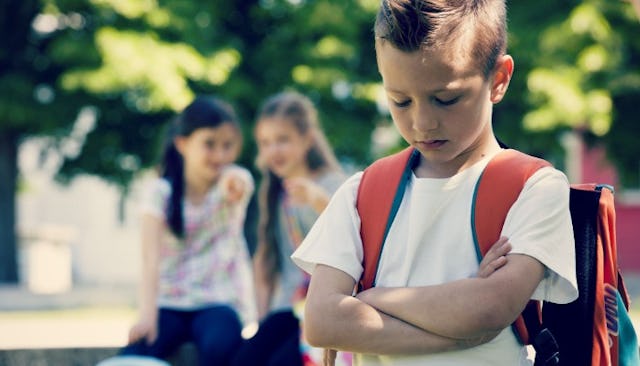Any Kid Can Be A Bully, Even Yours, So Let's Figure Out How To Work Through This Together

Recently, my 6-year-old has had some trouble with bullies on his school bus.
It’s almost insane to say, “bullies” and “6-year-old,” especially in an era when more attention is given to the dangers of bullying than ever before, but here we are.
My wife and I are doing our best to squash it, which isn’t easy when your kid is too young to emotionally protect himself, too young to understand how to defend himself, too young to understand why it’s happening. Hell, I’m 40 and I don’t understand why it’s happening. That’s partially because he’s my son, of course, and it seems outrageous that anyone could ever have a problem with such a sweet, funny, sure-sometimes-he-annoys-the-hell-out-of-me-but-he’s-6-and-I-live-with-him little guy.
It’s not easy for parents to reconcile our unconditional love for our kids with the less subjective, three-dimensional view the rest of the world has of them. Which isn’t to say our perspective is wrong; it’s just different. Sometimes we miss the trees for the forest. Our love tends to blind us, which can leave us blindsided.
My son is far from blameless. He’s blameless in this current scenario, but he’s been the aggressor a time or two in the past, and he surely will be again. He’s been the ringleader of his friends. He’s been guilty of excluding friends or calling names or being a jerk. He’s a little kid. That’s what little kids do, for a variety of reasons, the least likely of which is that the kid is a bad seed. The behavior almost always has a source, and when they’re this young, it’s important to discover that source and try to nip it in the bud. I don’t blame the bully. Not yet. After all, there but for the grace of God goes my kid, or yours.
Let’s imagine, for a minute, that it were flipped. Imagine that your kid weren’t the victim, but instead the bully. Imagine that your kid is the problem. Imagine that this is the end of A Time To Kill, and I am Matthew McConaughey. Alright, alright, alright. Let’s do this!
If my kid were the problem, I’d want to be told — whether by his teachers, by the kid he’s picking on, by the kid’s parents, or by anyone else who witnesses his behavior. I’m sure I’d chafe at first: “My son? I don’t think so!” But I hope I’m able to remember how kids are, how all kids are (yes, even the best kids, even our own kids). They’re kids — it’s what they do. Because despite the fact that my son is the victim now, the roles will surely be reversed someday. And when they are, it will be helpful to remind him what it was like on the other side.
As for moms and dads? I’m not sure what’s worse, being the powerless parent of a victim or being the perplexed parent of a bully. In both situations, it’s easy — and honestly maybe even a little necessary — to blame yourself.
When your kid is being bullied, you might wonder what you’re not teaching them, about self-esteem, about self-defense, about walking away. If you’re Clint Eastwood or Donald Trump or maybe even your own father or grandfather, men who grew up in different times, you might even be tempted to blame your son for being a nerd or a wuss — which is repugnant and a relic of less enlightened days, but it still happens (hopefully not in your home or you really do need to blame yourself).
When your kid is the actual bully, you might wonder what’s causing them to act out. It could be any number of things. Maybe they’re being bullied elsewhere, maybe they’ve noticed you and your spouse arguing, maybe they’re struggling with school, maybe the Dolphins blew another shot at the playoffs. Who knows?
That was a trick question. You should know. And if you don’t, it’s on you to find out. And to fix it.
Whether your kid has a bullseye on their back or is the one taking aim, parenting needs to be done, and neither situation lends itself to easy answers. The number one thing you can do is be there, and try.
I’ve spoken to the father of the little boy who’s mistreating my son, and to his credit and my relief, he’s been receptive. He doesn’t like his son’s behavior any more than I do, and instead of being defensive, he’s taking responsibility for it, and I’m trusting him to work through things with his kid. After all, his son is only 7 — a year older than mine, which makes a huge difference at such a young age, but does not exactly make for a wise elder.
No, the elders in this situation are us. And difficult as it may be, we’d better do our best to act like it. The kids are counting on us.
This article was originally published on